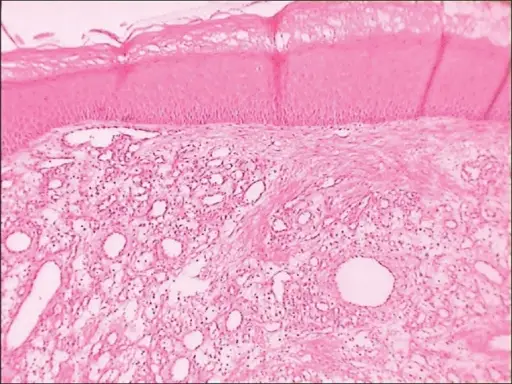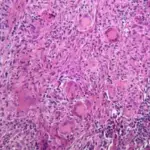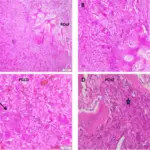Pyogenic granuloma is also known as lobular capillary hemangioma – is a benign vascular tumor that occurs on the skin and mucous membranes, occasional it can be found subcutaneously or intravascularly.
What is the Pathology of Pyogenic Granuloma?
The pathology of pyogenic granuloma is:
-Etiology: The cause of pyogenic granuloma is trauma caused by cheek bites or by sharp cusps or fractured teeth.
-Pathogenesis: The sequence of events that lead to pyogenic granuloma is a response of tissues to minor trauma and/or chronic irritation, thus opening a pathway for invasion of nonspecific microorganisms, although microorganisms are seldom demonstrated within the lesion.
-Histology: The histology associated with pyogenic granuloma shows parakeratotic or non-keratinized stratified squamous epithelium.
How does Pyogenic Granuloma Present?
Patients with pyogenic granuloma typically affect females present at the age range of 20-60 years. The symptoms, features, and clinical findings associated with pyogenic granuloma include small shiny soft papules, with a smooth or slightly irregular surface, which is always elevated above the skin. It grows over a few days to reach its largest size, which is typically less than 2 cm. Larger lesions are uncommon but have been known to occur. It then stops enlarging and its diameter remains stationary for several weeks. The most conspicuous symptom is the ready occurrence of bleeding following even insignificant mechanical trauma.
How is Pyogenic Granuloma Diagnosed?
Pyogenic Granuloma is diagnosed based on its appearance. A biopsy is taken from the site to make a more accurate diagnosis.
How is Pyogenic Granuloma Treated?
Pyogenic Granuloma is treated by surgically removing if it’s recurred once after a nonsurgical approach. Alternatively, chemical, such as silver nitrate is applied to the pyogenic granuloma to help with the bleeding. These growths can also be removed using laser surgery.
What is the Prognosis of Pyogenic Granuloma?
The prognosis of pyogenic granuloma is fair but pyogenic granulomas can recur regardless of the therapeutic modality used.



